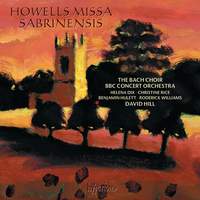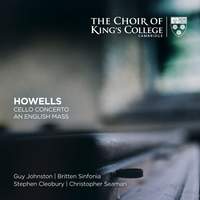Recording of the Week,
Howells from David Hill and the Bach Choir
This week’s Recording of the Week is some rarely-heard Howells – his large-scale Missa Sabrinensis for choir and orchestra, performed by the Bach Choir and BBC Concert Orchestra under David Hill. I’ll put my cards on the table right at the outset by saying that having acquainted myself with it, I think the relative neglect of this piece is little short of an outrage, and I fervently hope that this glorious recording can help to bring it to the audience it deserves.
 There have been a few signs that interest in this side of Howells is indeed reviving; a work for similar forces, his English Mass, received a much-needed new recording recently. Much of the same spirit pervades the Missa Sabrinensis - both see an avowedly atheist composer seeking inspiration from religious texts, and both explore similar heights and depths of emotion, stemming in no small part from Howells’s continued wrestling with the death of his young son Michael some two decades previously. The titular reference to the River Severn is less an indication of a rural idyll and more a hint of autobiographical subtexts to the Mass; the Severn physically links Lydney, where Howells was born and brought up; Gloucester, where he received his main musical education; and Worcester, a cathedral that would play a prominent role in his career as a church musician.
There have been a few signs that interest in this side of Howells is indeed reviving; a work for similar forces, his English Mass, received a much-needed new recording recently. Much of the same spirit pervades the Missa Sabrinensis - both see an avowedly atheist composer seeking inspiration from religious texts, and both explore similar heights and depths of emotion, stemming in no small part from Howells’s continued wrestling with the death of his young son Michael some two decades previously. The titular reference to the River Severn is less an indication of a rural idyll and more a hint of autobiographical subtexts to the Mass; the Severn physically links Lydney, where Howells was born and brought up; Gloucester, where he received his main musical education; and Worcester, a cathedral that would play a prominent role in his career as a church musician.
The Missa Sabrinensis is substantially larger than the English Mass, clocking in at well over an hour, and correspondingly symphonic in mood. The orchestra is not short of moments to shine – some stirring brass and percussion playing in the Gloria and Credo stands out in particular, as well as intricately-woven soloistic passages for the wind, and a sensitively-played introduction to the Sanctus that perfectly builds up to support the chorus’s entry. In general Howells treats it as a kind of extension of the choir rather than an accompaniment or a separate force; a source of more polyphonic lines to weave into his texture. The string blend assists greatly with this – integrating with the chorus so organically that despite the different timbres one somehow manages to hear it all as one continuum.
Four soloists enliven the sonic palette – rarely used as step-out performers, rather emerging from the choral lines at key moments and then being reabsorbed in tuttis. Soprano Helena Dix and tenor Benjamin Hulett enjoy a duet of sorts at the heart of the Kyrie, soaring over the chorus’s own climactic lines and rich brass chords at the end of the ‘Christe’ before the tension dissipates and delicately-placed wind solo fragments decorate a subdued conclusion. The soloists are most frequently used in combination, often as a full quartet as in the Benedictus and the more subdued sections of the Credo, and it’s credit to the sensitivity of both performers and conductor alike that these more chamber-like passages are no less effective than the monumental tuttis.
In many ways this seems to be quite different from the luscious, melodious Howells familiar to regular Anglican evensong-goers, where his canticles and anthems are firm favourites. Yet every so often a flash of that voice emerges – a turn of phrase, a harmonic progression – and the more one listens, the less “out of character” this huge, turbulent work appears. It becomes easy to re-hear the cut and thrust between the chorus and orchestra as merely a larger-scale version of Howells’s writing for organ and choir, the majestic tuttis as illustrations of what the expanded palette permits, enlivened by the BBC Concert Orchestra’s responsive playing. This rapturous, at times overwhelming style, with choir and orchestra perfectly moulded into a single musical body, is less a departure from the norm, more the result of Howells adapting his style to exploit larger forces.
As my colleagues are undoubtedly sick of hearing by now, I was recently absolutely pinned to the wall on first hearing the orchestrated version of Howells’s Te Deum Collegium Regale. This Mass takes that enormous, ecstatic sonority as its starting-point and from it explores a range and profundity of expression that goes far beyond the Howells we normally hear. This may be one of this year’s most significant choral recordings, and it is a performance not to be missed.
Helena Dix (soprano), Christine Rice (mezzo-soprano), Benjamin Hulett (tenor), Roderick Williams (baritone), BBC Concert Orchestra, Bach Choir, David Hill
Available Formats: CD, MP3, FLAC, Hi-Res FLAC
Guy Johnston (cello), Stephen Cleobury (organ), Britten Sinfonia, King's College Choir Cambridge, King's Voices, Christopher Seaman
Available Formats: 2 SACDs, MP3, FLAC, Hi-Res FLAC




